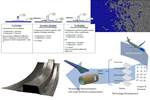Controlled polymer ablation technology seeks to redefine surface prep
CAMX 2024: Plasma Bound’s CPA technology, powered by quality control system Vulcan, applies atmospheric pressure plasma to achieve high-level composite bonding.
Figure 1: Controlled polymer ablation (CPA) process in application. It can be single or multiple heads. Source (All Images) | Plasma Bound
Plasma Bound (Dublin, Ireland), an Irish deep-tech company, excels in high-performance surface preparation for the bonding of composite assemblies across various industries. Its novel solution, controlled polymer ablation (CPA), tackles bonding difficulties for lightweight materials, such as carbon- and glass fiber-reinforced polymers. By using an atmospheric pressure plasma, CPA removes surface polymer, resulting in a highly energized surface with an enhanced surface area ready for bonding or coating.
Figure 2. Plasma Bound’s Vulcan control module, currently used to deploy the CPA process at the line.
The company’s CPA technology is underpinned by commercial atmospheric plasma equipment and is currently deployed using Plasma Bound’s quality assurance and control product, Vulcan (Fig. 2). Vulcan enables in-situ quality validation and process-level control of surfaces for adhesion applications, providing quality assurance records of process and parts on a batch and/or part basis.
Figure 3. Three “milestone” levels of CPA treatment on lightweight composites as viewed by the human eye. Inserts are scanning electron micrographs of the surface.
One of CPA’s stand-out features, is its precise control over the depth of polymer removal from the surface. Fig. 3 illustrates three progressive stages of removal from a carbon fiber composite — untreated, skimmed, partially and fully revealed fibers. The ability to target anywhere along the spectrum of these gradients enables different bonding strategies for different end-uses.
According to Plasma Bound, its CPA technology, powered by Vulcan, has been validated in the automotive sector and offers multiple benefits in various sectors, including:
- Automation: Facilitates faster assembly times and improved bond strengths.
- Lightweighting: Enables automakers to reduce vehicle weight without compromising safety, meeting stringent emissions regulations.
- Sustainability: Minimizes material waste, scrap production and energy consumption, aligning with circular economy principles.
- Fuel efficiency: Enhances fuel efficiency, critical for airlines and space exploration, by expanding the availability of lightweight structures.
- Reduced waste: Replaces wasteful peel-ply and abrasion processes, cutting down on scrap and rework efforts.
- Energy efficiency: Reduces energy consumption through a low-energy input process, eliminating unnecessary process steps, and removing consumables.
- Safer materials: Offers reliability and stronger lightweight structure along with reduced non-compliances.
Plasma Bound’s ambition is to deploy its CPA platform technology globally, to enable manufacturers to improve quality and safety, increase efficiency and reduce cost.
Related Content
-
Graphene-enhanced SMC boosts molded component properties
CAMX 2023: Commercially sold GrapheneBlack SMC from NanoXplore increases part strength, stiffness and provides other benefits for transportation, renewable energy, energy storage and industrial markets.
-
CAMX announces general session presenter, open registration
Attendees registered for the Oct. 31 – Nov. 2, 2023 event in Atlanta, Georgia, are invited to attend this year’s keynote put on by Joan Higginbotham, a former NASA astronaut and president of aerospace consulting firm Joan Higginbotham Ad Astra LLC.
-
VIDEO: Recycling and machining carbon fiber scraps
Elevated Materials has partnered with Toray Composite Materials America, Inc. to collect and upcycle reclaimed carbon fiber scraps into large billet laminates, which can then be cut into various parts using CNC mills.
















